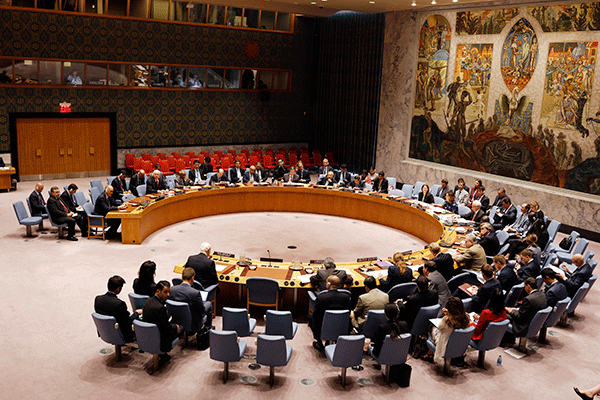China deserves to play a bigger role in the UN
Updated: 2016-09-27 07:49
By Fu Jing
|
||||||||
 |
|
Photo taken on Sept 25, 2016 shows the United Nations Security Council holding an emergency meeting on the situation in Syria, at the UN headquarters in New York, the United States.[Photo/Xinhua] |
After the G20 Summit in Hangzhou, East China's Zhejiang province, and the United Nations General Assembly session in New York, it's time to think how Beijing can help reform global governance further.
China has taken many proactive measures in recent years that the international community responded well to, but it could now go the extramile and turn the new project-based initiatives into institutional organizations based in China under the UN framework.
The world is becoming multi-polar and China has become an influential player, contributing hugely to global growth. And because the West is not sincere about keeping its promise of allowing China to play a bigger role on the world stage, China has taken (and has to further take) more proactive measures to propel globalization. Global governance today does not fully reflect China's true global role because most of the important international cooperation, security, trade and financial institutions are located either in the United States or Europe.
The UN, International Monetary Fund and World Bank are headquartered in the US, and Americans have always held the World Bank president's post. The UN has another headquarters in Geneva, Switzer-land, where the World Trade Organization and many other international institutions are based. Paris, Vienna, Rome, Bonn and other European cities are home to international organizations that coordinate cross-border educational, cultural, scientific, food safety and climate change issues.
As for Asia, which has the biggest share of the world's population and has been driving global growth for some time, the UN has set up just an economic and social council in Thailand and a university in Japan.
For years, China has been taking active part in UN programs to reduce poverty, and increase regional connectivity, South-South cooperation and sustainable development.
This valuable experience, along with its know-how and experience in such fields, can help China establish institutional organizations under the UN framework.
This is not to say that international organizations should be relocated to China but to suggest that the UN consider setting up offices in China to give shape to new ideas. For example, after the UN Development Programme and China signed a memorandum of understanding on the Belt and Road Initiative during Premier Li Keqiang's visit to New York to attend the UN General Assembly, the two sides should consider establishing a new platform to help more countries along the Silk Road Economic Belt and the 21st Century Maritime Silk Road to join the initiative and turn it into a truly global endeavor.
Besides, China's top universities are now training some future global leaders. Peking University has set up a South-South cooperation institute this year, Tsinghua University recently launched a project for global young leaders with a huge donation from an American national, and Beijing Normal University has established a G20 anti-corruption research center.
The UN should take notice of these developments and contemplate setting up a university in China that focuses on nurturing talents for the developing world. The newly established institute in Peking University, for instance, could be expanded to serve this purpose. But ideally, a UN university to boost South-South cooperation should not be in Beijing but in western China, because it will also help China develop in a balanced way.
China and the developed economies are now forging partnerships to help less-developed countries expedite their infrastructure construction in order to fight poverty. This so-called third-party cooperation sounds promising, for it will bring together all the advantages of the global economic chain.
Such endeavors demand more research and coordination platforms. So to realize the UN's Agenda for Sustainable Development by 2030, the UN and Beijing should also consider establishing a new office in the country to bring China, and the developed as well as less-developed countries together for global good.
The author is deputy chief of China Daily European Bureau
fujing@chinadaily.com.cn
- Renminbi use surges in London in spite of Brexit
- UN Security Council holds urgent meeting on Syria
- Confucius Institute US Center celebrates achievers
- DPRK holds Wonsan Intl Friendship Air Festival
- Car-crazy Mexico City celebrates World Carfree Day
- Death toll rises to 52 after migrant boat capsizes off Egypt

 Classic autos debut at Beijing Design Week
Classic autos debut at Beijing Design Week
 World in photos: Sept 19 - 25
World in photos: Sept 19 - 25
 Milan Fashion Week: Dolce & Gabbana Spring/Summer 2017
Milan Fashion Week: Dolce & Gabbana Spring/Summer 2017
 Hangzhou opens G20 summit arena to general public
Hangzhou opens G20 summit arena to general public
 Li, Trudeau inaugurate 'new annual dialogue'
Li, Trudeau inaugurate 'new annual dialogue'
 Milan Fashion Week: Prada Spring/Summer 2017
Milan Fashion Week: Prada Spring/Summer 2017
 Panchen Lama prayers at foot of Qomolangma
Panchen Lama prayers at foot of Qomolangma
 Ai Fukuhara and her newlywed husband show up in Taiwan
Ai Fukuhara and her newlywed husband show up in Taiwan
Most Viewed
Editor's Picks

|

|

|

|

|

|
Today's Top News
Trump outlines anti-terror plan, proposing extreme vetting for immigrants
Phelps puts spotlight on cupping
US launches airstrikes against IS targets in Libya's Sirte
Ministry slams US-Korean THAAD deployment
Two police officers shot at protest in Dallas
Abe's blame game reveals his policies failing to get results
Ending wildlife trafficking must be policy priority in Asia
Effects of supply-side reform take time to be seen
US Weekly

|

|







